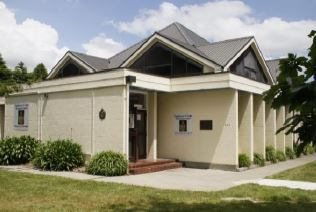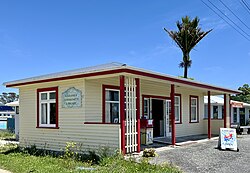
Karamea is a town on the West Coast of the South Island of New Zealand. It is the northernmost settlement of any real size on the West Coast, and is located 96 kilometres (60 mi) northeast by road from Westport. Apart from a narrow coastal strip, the town of Karamea and its local area are completely surrounded to the south, east and north by Kahurangi National Park.

New Zealand Parliament Buildings house the New Zealand Parliament and are on a 45,000 square metre site at the northern end of Lambton Quay, Wellington. From north to south, they are the Parliamentary Library building (1899); the Edwardian neoclassical-style Parliament House (1922); the executive wing, called "The Beehive" (1977); and Bowen House. Whilst most of the individual buildings are outstanding for different reasons, the overall setting that has been achieved "has little aesthetic or architectural coherence".

Studholme College is a residential college of the University of Otago in Dunedin, New Zealand situated on Clyde Street, a few minutes walk northeast of the university. Housing approximately 185 students, it is one of the smaller colleges in the region. It was founded as Studholme House in 1915 to provide facilities for domestic science students. The college maintains close links with the Department of Human Nutrition, though it now accepts students from all faculties.

Howick Historical Village is a living museum in Auckland, New Zealand. It is a recreation of a New Zealand colonial village using surviving buildings from the surrounding area. Despite its name, the Village is actually located in the suburb of Pakuranga.

The National War Memorial of New Zealand is located next to the Dominion Museum building on Buckle Street, in Wellington, the nation's capital. The war memorial was dedicated in 1932 on Anzac Day in commemoration of the First World War. It also officially remembers the New Zealanders who gave their lives in the South African War, World War II and the wars in Korea, Malaysia and Vietnam.

Seddonville is a lightly populated locality on the West Coast of New Zealand's South Island. It is most famous for the historical role it played in New Zealand's coal mining industry.

Dunedin Public Libraries is a network of six libraries and two bookbuses in Dunedin, New Zealand, owned and operated by the Dunedin City Council. The Libraries' collection includes over 700,000 items, and around 30,000 books and audiovisual items plus 15,000 magazines are added each year. Members can borrow or return items from any library or bookbus in the network.

The Johannesburg City Library is situated in the central business district of the City of Johannesburg. The Library is located in an Italianate building designed by John Perry which first opened in 1935. It has over 1.5-million books and items in its collection and more than 250 000 members.

Parliament House, in Lambton Quay, Wellington, is the main building of the New Zealand Parliament Buildings. It contains the Parliament's debating chamber, speaker's office, visitors' centre, and committee rooms. It was built between 1914 and 1922, replacing an earlier building that burned down in 1907. Parliament started using the yet to be completed building from 1918. Parliament House was extensively earthquake strengthened and refurbished between 1991 and 1995. It is open for visitors almost every day of the year, and is one of Wellington's major visitor attractions. Parliament House is a Category I heritage building registered by Heritage New Zealand.

Little Wanganui is a dairy-farming village on the West Coast of the South Island of New Zealand, on the Little Wanganui River. It is 77 kilometres (48 mi) north of Westport and 21 kilometres (13 mi) south of Karamea, at the opposite end of the Karamea Beach. The settlement has a pub, community hall, and volunteer fire brigade, and in 2013 the population was 207. There is a surfing beach, and the Little Wanganui River is popular for whitebaiting and fishing for brown trout.

The Karamea Aerodrome serves the town of Karamea, in the South Island of New Zealand. It is a non certificated aerodrome located around 1.4 kilometres (0.87 mi) northwest of the town.

The Engineer Corps Memorial Centre (ECMC) is a museum, library and chapel complex located at Linton Military Camp, south of Palmerston North, New Zealand. The centre focuses on the preservation of history and heritage of the Corps of Royal New Zealand Engineers (RNZE).
The Karitane Hospitals were six hospitals in New Zealand run by the Plunket Society, located in Auckland, Christchurch, Dunedin, Invercargill, Wanganui and Wellington. They were established as training hospitals for Karitane nurses and cared for babies with malnutrition and other dietetic complaints, and premature babies. They also offered mother care training and assistance. The first hospital opened in 1907 and the hospitals were closed between 1978 and 1980 due to financial difficulties and changes in society and maternity services.

The Ellen Melville Centre is a community centre located in Freyberg Square in central Auckland, New Zealand. It is named after Ellen Melville, the first woman to be elected to the Auckland City Council and the second New Zealand woman to become a lawyer.
Rangiotu is a farming community in the Manawatū District and Manawatū-Whanganui region in New Zealand's central North Island.

Granity Community Library is a small public library located in the settlement of Granity on the West Coast of New Zealand. It is listed as a Category II historic place by Heritage New Zealand.

All Saints' Church, also known as Hokitika Anglican Church, is an heritage-listed Anglican church located in Hokitika, on the West Coast of the South Island of New Zealand. The church forms part of the Ross and South Westland parish of the Diocese of Christchurch within the Anglican Church in Aotearoa, New Zealand and Polynesia. The church building is a Category I building on the Heritage New Zealand register.

The Westland District Library is the public library in Hokitika, on the West Coast of New Zealand. Beginning as the Hokitika Literary Society in 1866, it occupied a Carnegie library building from 1908 as the Hokitika Free Public Library, moving out in 1975.

The Sue Thomson Casey Memorial Library, also known as the Westport Library and the Buller District Library, is a district library located in Westport in the West Coast region of the South Island of New Zealand.

The H. E. Holland Memorial Library, also known as the Seddonville Community Library, is a community library located in Seddonville in the Buller District of the South Island of New Zealand.




















